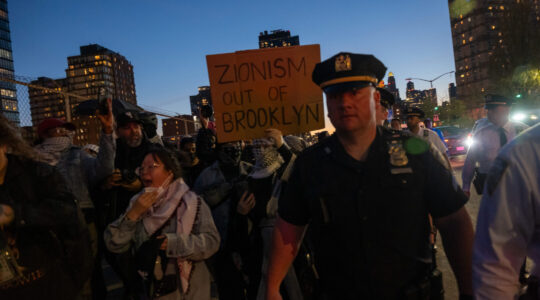My shovel hits the ground but refuses to sink any further. I step on it, jump on it, jam it into the rock-hard brown earth and examine the inch-deep dent it makes. Repeat. I stand on a nondescript street corner in Staten Island surrounded by 29 other teenagers who are hard at work with rakes and shovels. I am at BBYO Stand UP and Rebuild: A Teen Issue Summit on the Power of Service. For three days in June we helped heal the Staten Island community after the devastation caused by Hurricane Sandy more than eight months ago.
On the first night of BBYO Stand UP and Rebuild, I and 100 other teen participants listened to representatives from New York’s Metropolitan Council on Jewish Poverty (Met Council) speak about the aftermath of Hurricane Sandy. We spent the next day engaged in community service to rebuild the community — the 29 of us logged a total of 1,080 hours of service.
When I heard about the summit several months ago I was immediately interested in being involved, having attended a similar summit on equality almost two years prior. I didn’t just want to attend the summit; I wanted to make it as meaningful for the participants as the one summit on equality was for me. So I applied and was ecstatic to be selected as one of four teen coordinators.
I worked with the other three coordinators on recruiting participants — Josie Roth of Boca Raton, Fla.; Kyle Price of Scarsdale, N.Y.; and Judah Burstein of Brookline, Mass. We created promotional videos, emails and Facebook postings on the summit. Our efforts were successful as we ended up with nearly 100 attendees.
After recruiting teens, we worked on programming with the help of Natalie Spring, BBYO’s director of campaigns and leadership initiatives. Over four weeks we developed three programs that were successfully executed during the summit. The opening session was about the power of service and helped teens get acquainted with the other participants.
Next, we led a program where the teens broke into groups and established mock non-profit organizations. This exercise taught the importance of creativity and people skills in developing solutions to problems we care about. Our closing program inspired teens to dedicate themselves to public service in their home towns.
After our planning was complete, we focused on getting participants excited about the summit. However, some concerns stayed with me: What if no one liked the work? What if it wasn’t meaningful and they just didn’t do it? My worries were nullified after our opening day program. Representatives from the Met Council shared with us many stories about the horrors they and their clients witnessed. One that hit home with most people was the heartbreaking story of Patricia Dresch.
Dresch lived on Staten Island with her husband and daughter. When Hurricane Sandy hit, the family’s attempts to flee to higher ground were thwarted as more and more water submerged their home, eventually washing it away. The family was carried away in separate directions. Dresch suffered serious injuries, but was able to recover — physically, at least. Her family and home were lost forever.
“After she spoke, I felt like helping at our service sights wasn't just something I was going to be doing; it felt like something I had to do,” said Leda Estrine, 16, from Boca Raton, Fla.
After the hurricane, Devorah Weiss, a Met Council social worker, went into the devastated areas, set up a table and asked people what they needed. She said the requests were surprisingly small. “Just a new pair of sneakers. Just a little bit of food.” It was amazing that these little things were so important to hurricane victims who lost everything, like Dresch.
After hearing how grateful storm victims were for Weiss’ help with fulfilling small requests, I was inspired to work hard the next day at my service site. We weeded, mulched and planted a plot of land at the entrance of a residential community to make it feel like a place to be proud to live in once again. Twelve hours of seemingly unimportant busywork seemed insignificant. I thought that beautifying one street corner in Staten Island would be meaningless compared to the homeless, widowed or bankrupt victims of the hurricane. But Weiss’ testimony led me to the opposite conclusion.
Little things matter a lot in the wake of disaster and tragedy. When one is left with nothing, receiving something, anything, becomes valuable and important. No one needed a green garden on a neighborhood street corner. We wanted to make something pretty to look at on an island devastated by the storm. We wanted residents to see that a group of teens cared and made time to help.
I am so glad that we had the opportunity to hear from members of the Met Council because the stories they shared were heartbreaking and inspiring. They pushed me to work my hardest at my service site over the next two days. I knew I was doing something real, something that actually mattered.
The New York Jewish Week brings you the stories behind the headlines, keeping you connected to Jewish life in New York. Help sustain the reporting you trust by donating today.




